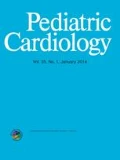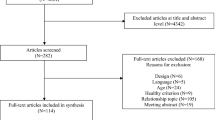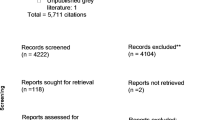Abstract
To evaluate the moderating influence of parental variables on changes in health-related quality of life (HRQoL) in adolescents with Tetralogy of Fallot (ToF) or a Fontan circulation after participation in standardized exercise training. A multicenter randomized controlled trail in which 56 patients, aged 10–15, were randomly allocated (stratified by age, gender, and congenital heart disease) to a 12-week period with either: (a) 3 times per week standardized exercise training or (b) care-as-usual (randomization ratio 2:1). Adolescents and their parents filled in online questionnaires at baseline and at 12-week follow-up. In this randomized controlled trail, primary analyses involved influence of parental mental health and parental social support for exercise on changes in the TNO/AZL Child Quality of Life Questionnaire Child Form at follow-up. Secondary analyses concerned comparing levels of parental characteristics with normative data. Compared with controls, adolescents in the exercise group reported a decrease in social functioning when their parents had more anxiety/insomnia or severe depression themselves. Adolescents also reported a decrease in social functioning when their parents showed poorer overall mental health themselves. Parents reported comparable or even better mental health compared with normative data. The effect of a standardized exercise program on HRQoL changes in adolescents with ToF or a Fontan circulation is moderated by parental mental health, more specifically by parental anxiety/insomnia and severe depression. The trial registration number of this article is NTR2731 (www.trialregister.nl).


Similar content being viewed by others
References
Bar-Mor G, Bar-Tal Y, Krulik T, Zeevi B (2000) Self-efficacy and physical activity in adolescents with trivial, mild, or moderate congenital cardiac malformations. Cardiol Young 10(6):561–566
Berant E, Mikulincer M, Shaver PR (2008) Mothers’ attachment style, their mental health, and their children’s emotional vulnerabilities: a 7-year study of children with congenital heart disease. J Pers 76(1):31–65. doi:10.1111/j.1467-6494.2007.00479.x
Cohen J (1992) A power primer. Psychol Bull 112(1):155–159
Colletti CJ, Wolfe-Christensen C, Carpentier MY, Page MC, McNall-Knapp RY, Meyer WH, Chaney JM, Mullins LL (2008) The relationship of parental overprotection, perceived vulnerability, and parenting stress to behavioral, emotional, and social adjustment in children with cancer. Pediatr Blood Cancer 51(2):269–274. doi:10.1002/pbc.21577
Colville G, Cream P (2009) Post-traumatic growth in parents after a child’s admission to intensive care: maybe Nietzsche was right? Intensiv Care Med 35(5):919–923. doi:10.1007/s00134-009-1444-1
Dulfer K, Helbing WA, Duppen N, Utens EM (2013) Associations between exercise capacity, physical activity, and psychosocial functioning in children with congenital heart disease: a systematic review. Eur J Prev Cardiol. doi:10.1177/2047487313494030
Duppen N, Takken T, Hopman MT, Ten Harkel AD, Dulfer K, Utens EM, Helbing WA (2013) Systematic review of the effects of physical exercise training programmes in children and young adults with congenital heart disease. Int J Cardiol. doi:10.1016/j.ijcard.2013.05.086
Goldberg DP (1972) The detection of psychiatric illness by questionnaire. Oxford University Press, London
Gustafson SL, Rhodes RE (2006) Parental correlates of physical activity in children and early adolescents. Sports Med 36(1):79–97
Kamphuis M, Zwinderman KH, Vogels T, Vliegen HW, Kamphuis RP, Ottenkamp J, Verloove-Vanhorick SP, Bruil J (2004) A cardiac-specific health-related quality of life module for young adults with congenital heart disease: development and validation. Qual Life Res 13(4):735–745
Koeter MWJ, Ormel J (1992) General Health Questionnaire. Dutch version. Swets & Zeitlinger, Lisse
Kraemer HC, Wilson GT, Fairburn CG, Agras WS (2002) Mediators and moderators of treatment effects in randomized clinical trials. Arch Gen Psychiatry 59(10):877–883
Latal B, Helfricht S, Fischer JE, Bauersfeld U, Landolt MA (2009) Psychological adjustment and quality of life in children and adolescents following open-heart surgery for congenital heart disease: a systematic review. BMC Pediatr 9:6. doi:10.1186/1471-2431-9-6
Lawoko S, Soares JJ (2006) Psychosocial morbidity among parents of children with congenital heart disease: a prospective longitudinal study. Heart Lung 35(5):301–314. doi:10.1016/j.hrtlng.2006.01.004
Lunt D, Briffa T, Briffa NK, Ramsay J (2003) Physical activity levels of adolescents with congenital heart disease. Aust J Physiother 49(1):43–50
Luyckx K, Goossens E, Rassart J, Apers S, Vanhalst J, Moons P (2012) Parental support, internalizing symptoms, perceived health status, and quality of life in adolescents with congenital heart disease: influences and reciprocal effects. J Behav Med. doi:10.1007/s10865-012-9474-5
Majnemer A, Limperopoulos C, Shevell M, Rohlicek C, Rosenblatt B, Tchervenkov C (2006) Health and well-being of children with congenital cardiac malformations, and their families, following open-heart surgery. Cardiol Young 16(2):157–164. doi:10.1017/S1047951106000096
McCrindle BW, Williams RV, Mital S, Clark BJ, Russell JL, Klein G, Eisenmann JC (2007) Physical activity levels in children and adolescents are reduced after the Fontan procedure, independent of exercise capacity, and are associated with lower perceived general health. Arch Dis Child 92(6):509–514. doi:10.1136/adc.2006.105239
McCusker CG, Doherty NN, Molloy B, Casey F, Rooney N, Mulholland C, Sands A, Craig B, Stewart M (2007) Determinants of neuropsychological and behavioural outcomes in early childhood survivors of congenital heart disease. Arch Dis Child 92(2):137–141. doi:10.1136/adc.2005.092320
Moller P, Weitz M, Jensen KO, Dubowy KO, Furck AK, Scheewe J, Kramer HH, Uebing A (2009) Exercise capacity of a contemporary cohort of children with hypoplastic left heart syndrome after staged palliation. Eur J Cardiothorac Surg 36(6):980–985. doi:10.1016/j.ejcts.2009.06.029
Moola F, Faulkner GE, Kirsh JA, Kilburn J (2008) Physical activity and sport participation in youth with congenital heart disease: perceptions of children and parents. Adapt Phys Activ Q 25(1):49–70
Moola F, Fusco C, Kirsh JA (2010) The perceptions of caregivers toward physical activity and health in youth with congenital heart disease. Qual Health Res. doi:10.1177/1049732310384119
Ornelas IJ, Perreira KM, Ayala GX (2007) Parental influences on adolescent physical activity: a longitudinal study. Int J Behav Nutr Phys Act 4:3. doi:10.1186/1479-5868-4-3
Rapkin BD, Schwartz CE (2004) Toward a theoretical model of quality-of-life appraisal: implications of findings from studies of response shift. Health Qual Life Outcomes 2:14. doi:10.1186/1477-7525-2-14
Sallis JF, Grossman RM, Pinski RB, Patterson TL, Nader PR (1987) The development of scales to measure social support for diet and exercise behaviors. Prev Med 16(6):825–836
Schulz KF, Altman DG, Moher D, Group C (2010) CONSORT 2010 statement: updated guidelines for reporting parallel group randomised trials. BMJ 340:c332
Spijkerboer AW, Utens EM, De Koning WB, Bogers AJ, Helbing WA, Verhulst FC (2006) Health-related quality of life in children and adolescents after invasive treatment for congenital heart disease. Qual Life Res 15(4):663–673
Spijkerboer AW, Helbing WA, Bogers AJ, Van Domburg RT, Verhulst FC, Utens EM (2007) Long-term psychological distress, and styles of coping, in parents of children and adolescents who underwent invasive treatment for congenital cardiac disease. Cardiol Young 17(6):638–645. doi:10.1017/S1047951107001333
Stevens M, Bakker van Dijk A, de Greef MH, Lemmink KA, Rispens P (2000) A Dutch version of the social support for exercise behaviors scale. Percept Mot Skills 90(3 Pt 1):771–774
Utens EM, Versluis-Den Bieman HJ, Witsenburg M, Bogers AJ, Hess J, Verhulst FC (2002) Does age at the time of elective cardiac surgery or catheter intervention in children influence the longitudinal development of psychological distress and styles of coping of parents? Cardiol Young 12(6):524–530
Verrips GH, Vogels AG, den Ouden AL, Paneth N, Verloove-Vanhorick SP (2000) Measuring health-related quality of life in adolescents: agreement between raters and between methods of administration. Child Care Health Dev 26(6):457–469
Vogels T, Bruil J, Koopman H, Fekkes M, Verrips GHW (2004) TACQOL CF 12-15 Manual Developed by Leiden Center for Child Health and Pediatrics LUMC-TNO
Vrijmoet-Wiersma CM, Ottenkamp J, van Roozendaal M, Grootenhuis MA, Koopman HM (2009) A multicentric study of disease-related stress, and perceived vulnerability, in parents of children with congenital cardiac disease. Cardiol Young 19(6):608–614. doi:10.1017/S1047951109991831
Wang Q, Hay M, Clarke D, Menahem S (2013) Associations between knowledge of disease, depression and anxiety, social support, sense of coherence and optimism with health-related quality of life in an ambulatory sample of adolescents with heart disease. Cardiol Young 24:126. doi:10.1017/S1047951113000012
Wray J, Sensky T (2004) Psychological functioning in parents of children undergoing elective cardiac surgery. Cardiol Young 14(2):131–139. doi:10.1017/S1047951104002045
Yagc-Kupeli B, Akyuz C, Kupeli S, Buyukpamukcu M (2012) Health-related quality of life in pediatric cancer survivors: a multifactorial assessment including parental factors. J Pediatr Hematol Oncol 34(3):194–199. doi:10.1097/MPH.0b013e3182467f5f
Acknowledgments
The authors thank the children and their parents for participation in this RCT. K. Dulfer was supported by a research grant from Stichting Rotterdams Kinderrevalidatie Fonds Adriaanstichting. N. Duppen was sponsored by a research grant from Netherlands Heart Foundation (2008B026).
Author information
Authors and Affiliations
Corresponding author
Rights and permissions
About this article
Cite this article
Dulfer, K., Duppen, N., Van Dijk, A.P.J. et al. Parental Mental Health Moderates the Efficacy of Exercise Training on Health-Related Quality of Life in Adolescents with Congenital Heart Disease. Pediatr Cardiol 36, 33–40 (2015). https://doi.org/10.1007/s00246-014-0961-z
Received:
Accepted:
Published:
Issue Date:
DOI: https://doi.org/10.1007/s00246-014-0961-z




